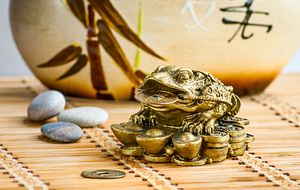For the first time since moving into my xiaoqu, or “little district,” I was invited into a neighbor’s home the other day. It was so tastefully decorated it looked like a Gensler project, so I was not surprised when he said he’d hired a fengshui master to design it.
Given China’s reputation for secularity, the idea of inviting a stranger into one’s home to perform superstitious rituals may seem odd. However, Chinese belief in supernatural causation is widespread. People pay fortunes for lucky cell phone numbers, pregnant mothers have “stampeded to delivery rooms” for auspicious birthdates, zhongyi (Chinese medicine) has yet to rid itself of its many bogus therapies, and (at least among ambitious Chinese officials) fengshui is experiencing a “mystical revival.”
To the uninitiated, this may seem ludicrous. Even Matteo Ricci, the Jesuit missionary known for his sensitivity toward Chinese culture, asked in De Christiana expeditione apud Sinas, “What could be more absurd than their imagining that the safety of a family, honors, and their entire existence must depend upon such trifles as a door being opened from one side or another […]?”
Fengshui, literally “wind water,” is essentially a means of harmonizing physical structures with the élan vital or life force known as qi, which is disseminated by wind and adheres to water like so many grains of pollen. It began as a way of building tombs to harness qi currents and later became a method of orienting homes so that they too might achieve harmony with their natural environment.
The fundamentals are incredibly sensible, with the kind of root and branch practicality that is so typical of Chinese culture. Unfortunately, over time its insights have accumulated the dust of superstition, such as the belief that hanging a wok on a wall will deflect bad energy. For this reason, fengshui found no quarter in communist China; it was included in the Four Olds and subsequently banned. Fengshui masters were beaten, their works destroyed, and even today, it remains illegal.
Fengshui’s sensitivity to surroundings has prompted some to describe it as a kind of environmentalism (clean air, for example, is highly prized). This sensitivity, a hallmark of scientific discovery, has allowed for some important technological developments. For instance, the first magnetic compass was a fengshui instrument whereby polarity was viewed as an expression yin and yang.
Currently, fengshui comprises two primary schools of thought. The oldest, the Form School, focuses on how geography influences qi. The other major school, the Cosmology School, looks at features such as the birth date and gender of residents or the direction in which one’s home faces.
In Feng Shui, Dr. Shan-Tung Hsu, founder of the Blue Mountain Institute, describes the use of crystals, mirrors, bamboo flutes, wind chimes, fish tanks, fengshui clothes and other paraphernalia as “creative marketing schemes” or, at best, pieces of “Asian décor.” The popular idea that all rooms should contain wuxing (five elements) artifacts or have their walls painted accordingly is, he says, “not valid.”
Hsu describes the jin chan (gold toad), a three-legged toad with coins in its mouth, which is a popular fengshui charm for prosperity, as “amusing.” If you “find it humorous, it is fine,” Hsu says, “but do not expect it to bring you fortune.” As for placing a mirror behind the stove to double one’s wealth, he points out that this idea originated in the U.S. in the 1970s and asks, “Wouldn’t it be great if this wishful thinking were true? All poverty issues could be solved!”
Such fengshui “gadgets,” he says, are not at all related to real fengshui. “However,” he adds, “if you are happy with any gadget you own then it may have already served its purpose.”
In my neighbor’s apartment, I remembered a line from Thomas Pynchon’s 1997 Mason & Dixon, in which the character Zhang, a fengshui master, described right angles as unnatural things that “inflict upon the Dragon’s very Flesh, a sword-slash, a long, perfect scar.” Was fengshui itself, I wondered, a “right angle” slicing into modern China?
I have to admit though, I envied his apartment. It was soothing but bright, elegant yet cozy. When I mentioned Dr. Hsu to my neighbor, he laughed. “Yes, it’s superstitious,” he said, “but it’s basically an art form. Have you ever met an artist who wasn’t superstitious?”
“Fine,” I said, “but people take this stuff seriously. They spend fortunes on it. They make important life decisions based on it. I don’t think it should be illegal, but I think the government was right to consider it a harmful force.”
“People are just as superstitious about art,” he replied, “they spend fortunes on that too. The way some people talk in galleries, you’d think they were religious fundamentalists. But then you look at the art, and you find sometimes that you agree.”
































